Page 289 of 418
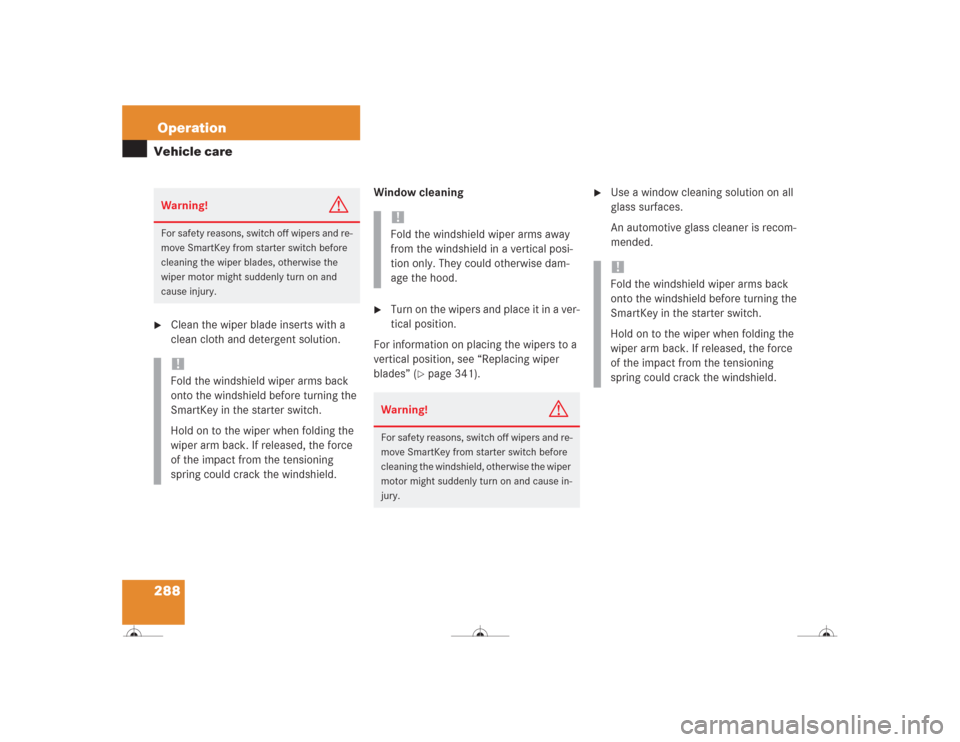
288OperationVehicle care�
Clean the wiper blade inserts with a
clean cloth and detergent solution.Window cleaning
�
Turn on the wipers and place it in a ver-
tical position.
For information on placing the wipers to a
vertical position, see “Replacing wiper
blades” (
�page 341).
�
Use a window cleaning solution on all
glass surfaces.
An automotive glass cleaner is recom-
mended.
Warning!
G
For safety reasons, switch off wipers and re-
move SmartKey from starter switch before
cleaning the wiper blades, otherwise the
wiper motor might suddenly turn on and
cause injury.!Fold the windshield wiper arms back
onto the windshield before turning the
SmartKey in the starter switch.
Hold on to the wiper when folding the
wiper arm back. If released, the force
of the impact from the tensioning
spring could crack the windshield.
!Fold the windshield wiper arms away
from the windshield in a vertical posi-
tion only. They could otherwise dam-
age the hood. Warning!
G
For safety reasons, switch off wipers and re-
move SmartKey from starter switch before
cleaning the windshield, otherwise the wiper
motor might suddenly turn on and cause in-
jury.
!Fold the windshield wiper arms back
onto the windshield before turning the
SmartKey in the starter switch.
Hold on to the wiper when folding the
wiper arm back. If released, the force
of the impact from the tensioning
spring could crack the windshield.
Page 290 of 418
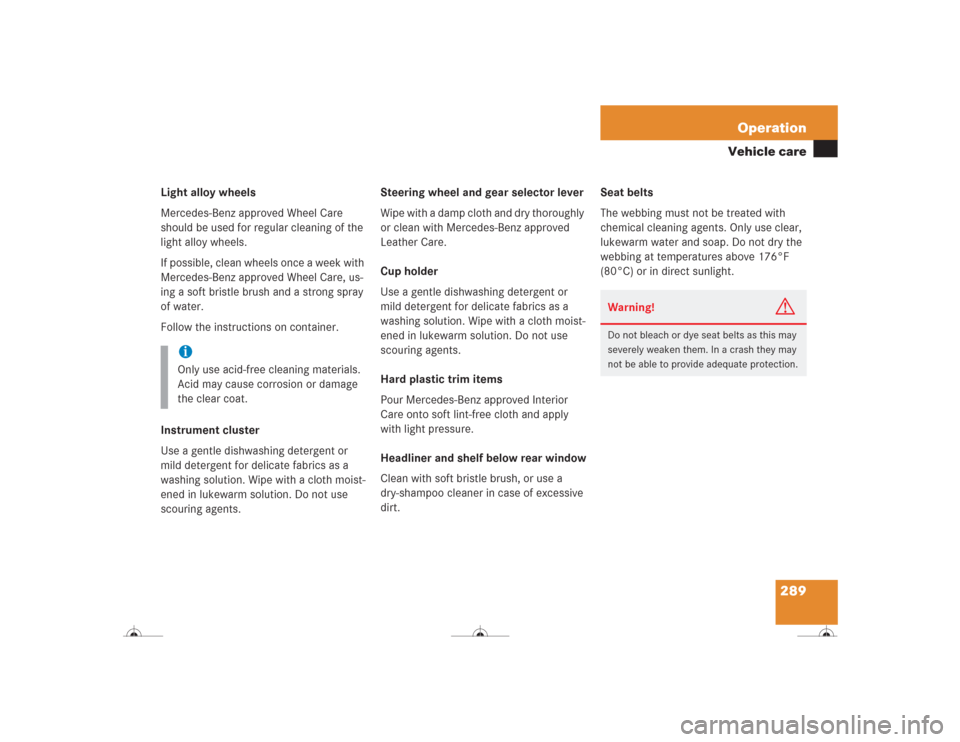
289 Operation
Vehicle care
Light alloy wheels
Mercedes-Benz approved Wheel Care
should be used for regular cleaning of the
light alloy wheels.
If possible, clean wheels once a week with
Mercedes-Benz approved Wheel Care, us-
ing a soft bristle brush and a strong spray
of water.
Follow the instructions on container.
Instrument cluster
Use a gentle dishwashing detergent or
mild detergent for delicate fabrics as a
washing solution. Wipe with a cloth moist-
ened in lukewarm solution. Do not use
scouring agents.Steering wheel and gear selector lever
Wipe with a damp cloth and dry thoroughly
or clean with Mercedes-Benz approved
Leather Care.
Cup holder
Use a gentle dishwashing detergent or
mild detergent for delicate fabrics as a
washing solution. Wipe with a cloth moist-
ened in lukewarm solution. Do not use
scouring agents.
Hard plastic trim items
Pour Mercedes-Benz approved Interior
Care onto soft lint-free cloth and apply
with light pressure.
Headliner and shelf below rear window
Clean with soft bristle brush, or use a
dry-shampoo cleaner in case of excessive
dirt.Seat belts
The webbing must not be treated with
chemical cleaning agents. Only use clear,
lukewarm water and soap. Do not dry the
webbing at temperatures above 176°F
(80°C) or in direct sunlight.
iOnly use acid-free cleaning materials.
Acid may cause corrosion or damage
the clear coat.
Warning!
G
Do not bleach or dye seat belts as this may
severely weaken them. In a crash they may
not be able to provide adequate protection.
Page 294 of 418
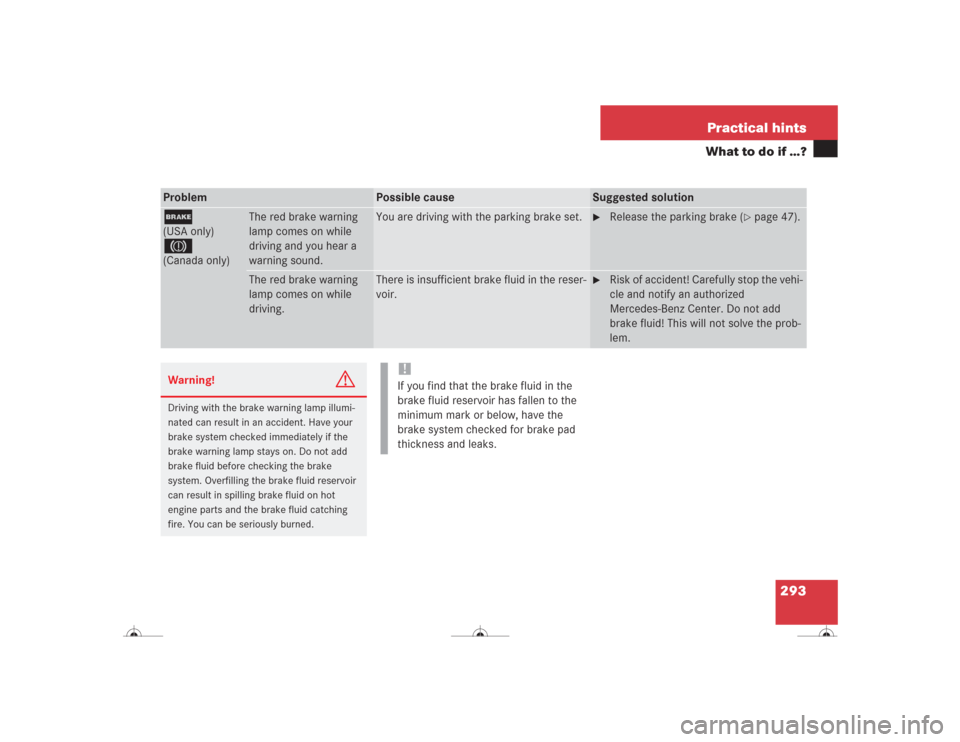
293 Practical hints
What to do if …?
Problem
Possible cause
Suggested solution
;(USA only)3(Canada only)
The red brake warning
lamp comes on while
driving and you hear a
warning sound.
You are driving with the parking brake set.
�
Release the parking brake (
�page 47).
The red brake warning
lamp comes on while
driving.
There is insufficient brake fluid in the reser-
voir.
�
Risk of accident! Carefully stop the vehi-
cle and notify an authorized
Mercedes-Benz Center. Do not add
brake fluid! This will not solve the prob-
lem.
Warning!
G
Driving with the brake warning lamp illumi-
nated can result in an accident. Have your
brake system checked immediately if the
brake warning lamp stays on. Do not add
brake fluid before checking the brake
system. Overfilling the brake fluid reservoir
can result in spilling brake fluid on hot
engine parts and the brake fluid catching
fire. You can be seriously burned.
!If you find that the brake fluid in the
brake fluid reservoir has fallen to the
minimum mark or below, have the
brake system checked for brake pad
thickness and leaks.
Page 296 of 418
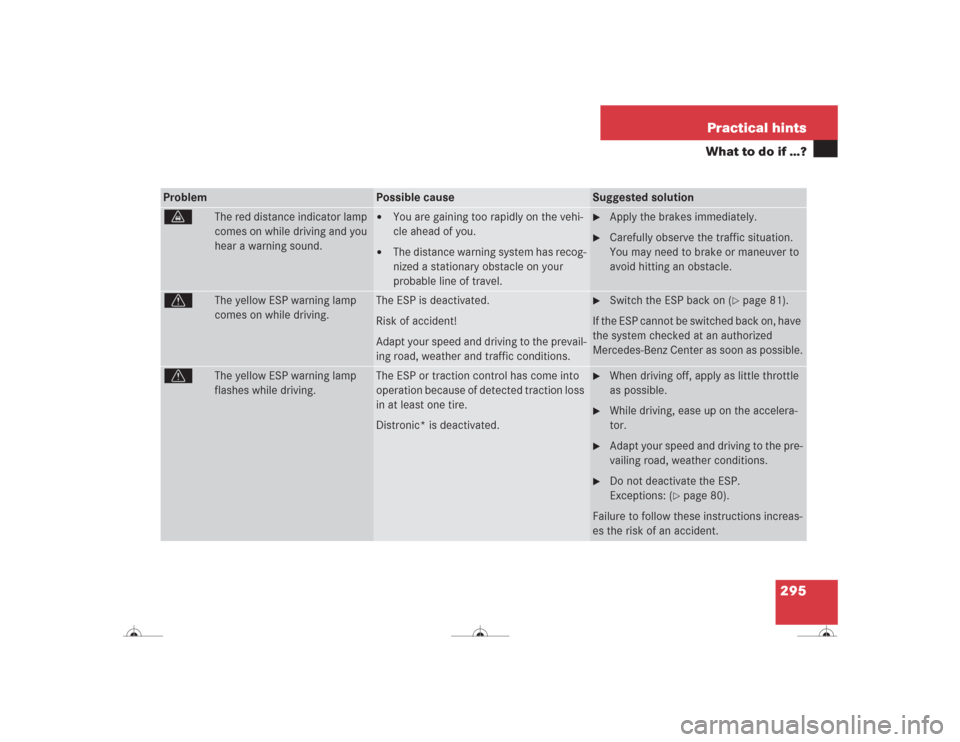
295 Practical hints
What to do if …?
Problem
Possible cause
Suggested solution
l
The red distance indicator lamp
comes on while driving and you
hear a warning sound.
�
You are gaining too rapidly on the vehi-
cle ahead of you.
�
The distance warning system has recog-
nized a stationary obstacle on your
probable line of travel.
�
Apply the brakes immediately.
�
Carefully observe the traffic situation.
You may need to brake or maneuver to
avoid hitting an obstacle.
v
The yellow ESP warning lamp
comes on while driving.
The ESP is deactivated.
Risk of accident!
Adapt your speed and driving to the prevail-
ing road, weather and traffic conditions.
�
Switch the ESP back on (
�page 81).
If the ESP cannot be switched back on, have
the system checked at an authorized
Mercedes-Benz Center as soon as possible.
v
The yellow ESP warning lamp
flashes while driving.
The ESP or traction control has come into
operation because of detected traction loss
in at least one tire.
Distronic* is deactivated.
�
When driving off, apply as little throttle
as possible.
�
While driving, ease up on the accelera-
tor.
�
Adapt your speed and driving to the pre-
vailing road, weather conditions.
�
Do not deactivate the ESP.
Exceptions: (
�page 80).
Failure to follow these instructions increas-
es the risk of an accident.
Page 297 of 418
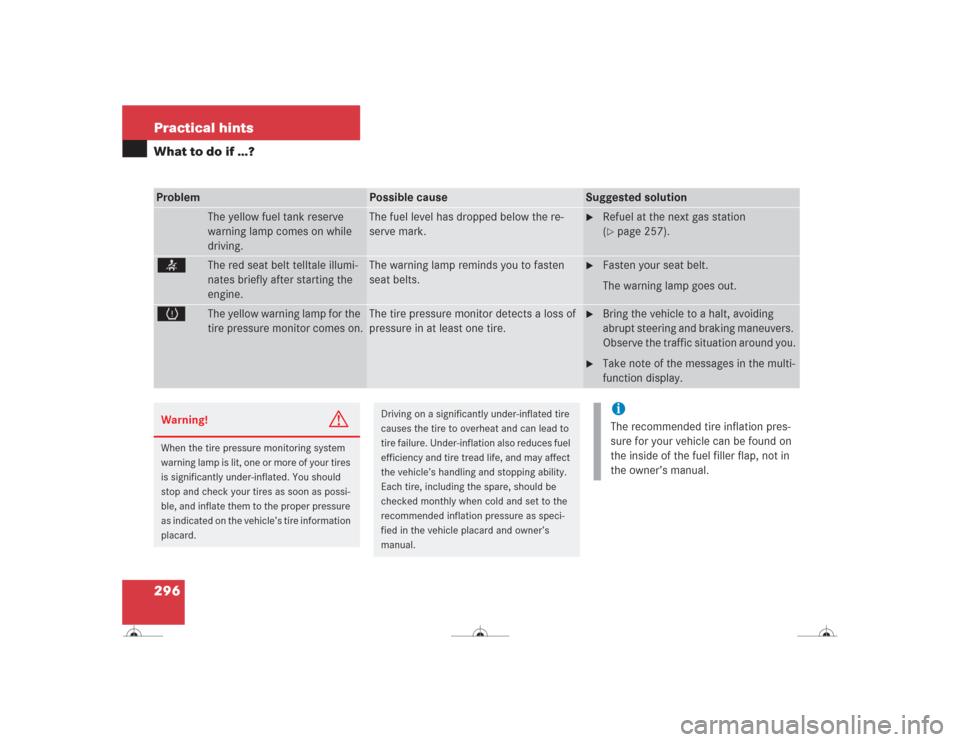
296 Practical hintsWhat to do if …?Problem
Possible cause
Suggested solution
The yellow fuel tank reserve
warning lamp comes on while
driving.
The fuel level has dropped below the re-
serve mark.
�
Refuel at the next gas station
(�page 257).
<
The red seat belt telltale illumi-
nates briefly after starting the
engine.
The warning lamp reminds you to fasten
seat belts.
�
Fasten your seat belt.
The warning lamp goes out.
H
The yellow warning lamp for the
tire pressure monitor comes on.
The tire pressure monitor detects a loss of
pressure in at least one tire.
�
Bring the vehicle to a halt, avoiding
abrupt steering and braking maneuvers.
Observe the traffic situation around you.
�
Take note of the messages in the multi-
function display.
Warning!
G
When the tire pressure monitoring system
warning lamp is lit, one or more of your tires
is significantly under-inflated. You should
stop and check your tires as soon as possi-
ble, and inflate them to the proper pressure
as indicated on the vehicle’s tire information
placard.
Driving on a significantly under-inflated tire
causes the tire to overheat and can lead to
tire failure. Under-inflation also reduces fuel
efficiency and tire tread life, and may affect
the vehicle’s handling and stopping ability.
Each tire, including the spare, should be
checked monthly when cold and set to the
recommended inflation pressure as speci-
fied in the vehicle placard and owner’s
manual.
iThe recommended tire inflation pres-
sure for your vehicle can be found on
the inside of the fuel filler flap, not in
the owner’s manual.
Page 298 of 418
297 Practical hints
What to do if …?
Problem
Possible cause
Suggested solution
1
The red SRS indicator lamp
comes on while driving.
There is a malfunction in the restraint sys-
tems. The airbags or emergency tensioning
device (ETDs) could deploy unexpectedly or
fail to activate in an accident.
�
Drive with added caution to the nearest
authorized Mercedes-Benz Center.
Warning!
G
In the event that a malfunction of the SRS is
indicated as outlined above, the SRS may
not be operational. For your safety, we
strongly recommend that you visit an autho-
rized Mercedes-Benz Center immediately to
have the system checked; otherwise the
SRS may not be activated when needed in
an accident, which could result in serious or
fatal injury, or it might deploy unexpectedly
and unnecessarily which could result in an
accident and/or injury to you or to others.
Page 300 of 418
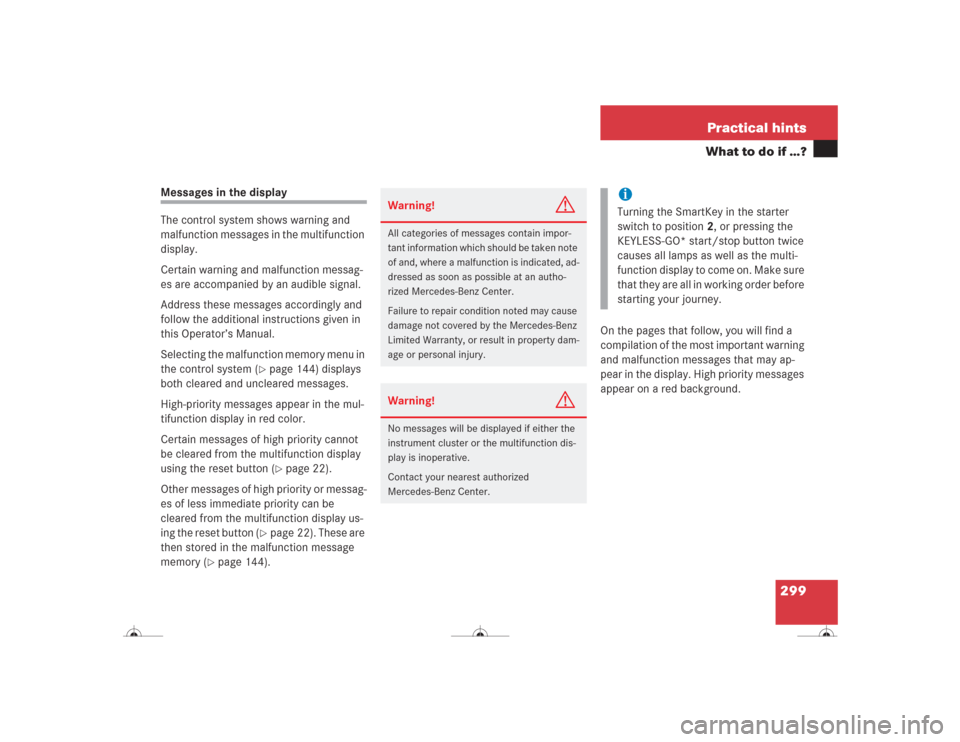
299 Practical hints
What to do if …?
Messages in the display
The control system shows warning and
malfunction messages in the multifunction
display.
Certain warning and malfunction messag-
es are accompanied by an audible signal.
Address these messages accordingly and
follow the additional instructions given in
this Operator’s Manual.
Selecting the malfunction memory menu in
the control system (
�page 144) displays
both cleared and uncleared messages.
High-priority messages appear in the mul-
tifunction display in red color.
Certain messages of high priority cannot
be cleared from the multifunction display
using the reset button (�page 22).
Other messages of high priority or messag-
es of less immediate priority can be
cleared from the multifunction display us-
ing the reset button (
�page 22). These are
then stored in the malfunction message
memory (
�page 144).On the pages that follow, you will find a
compilation of the most important warning
and malfunction messages that may ap-
pear in the display. High priority messages
appear on a red background.
Warning!
G
All categories of messages contain impor-
tant information which should be taken note
of and, where a malfunction is indicated, ad-
dressed as soon as possible at an autho-
rized Mercedes-Benz Center.
Failure to repair condition noted may cause
damage not covered by the Mercedes-Benz
Limited Warranty, or result in property dam-
age or personal injury.Warning!
G
No messages will be displayed if either the
instrument cluster or the multifunction dis-
play is inoperative.
Contact your nearest authorized
Mercedes-Benz Center.
iTurning the SmartKey in the starter
switch to position2, or pressing the
KEYLESS-GO* start/stop button twice
causes all lamps as well as the multi-
function display to come on. Make sure
that they are all in working order before
starting your journey.
Page 306 of 418
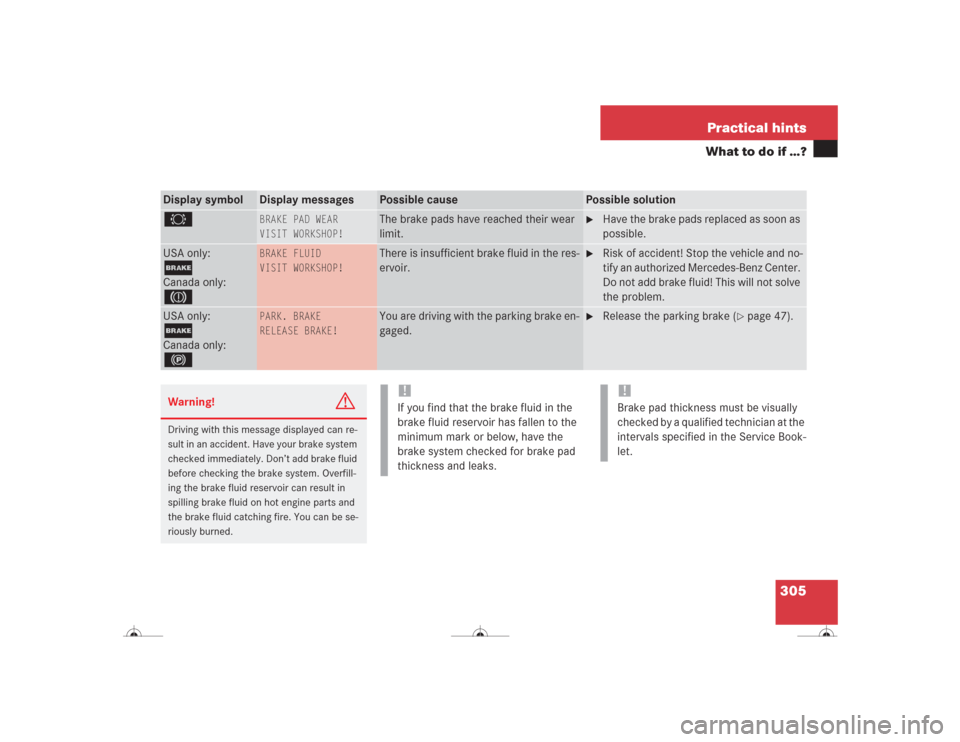
305 Practical hints
What to do if …?
Display symbol
Display messages
Possible cause
Possible solution
2
BRAKE PAD WEAR
VISIT WORKSHOP!
The brake pads have reached their wear
limit.
�
Have the brake pads replaced as soon as
possible.
USA only:;Canada only:3
BRAKE FLUID
VISIT WORKSHOP!
There is insufficient brake fluid in the res-
ervoir.
�
Risk of accident! Stop the vehicle and no-
tify an authorized Mercedes-Benz Center.
Do not add brake fluid! This will not solve
the problem.
USA only:;Canada only:!
PARK. BRAKE
RELEASE BRAKE!
You are driving with the parking brake en-
gaged.
�
Release the parking brake (
�page 47).
Warning!
G
Driving with this message displayed can re-
sult in an accident. Have your brake system
checked immediately. Don’t add brake fluid
before checking the brake system. Overfill-
ing the brake fluid reservoir can result in
spilling brake fluid on hot engine parts and
the brake fluid catching fire. You can be se-
riously burned.
!If you find that the brake fluid in the
brake fluid reservoir has fallen to the
minimum mark or below, have the
brake system checked for brake pad
thickness and leaks.
!Brake pad thickness must be visually
checked by a qualified technician at the
intervals specified in the Service Book-
let.